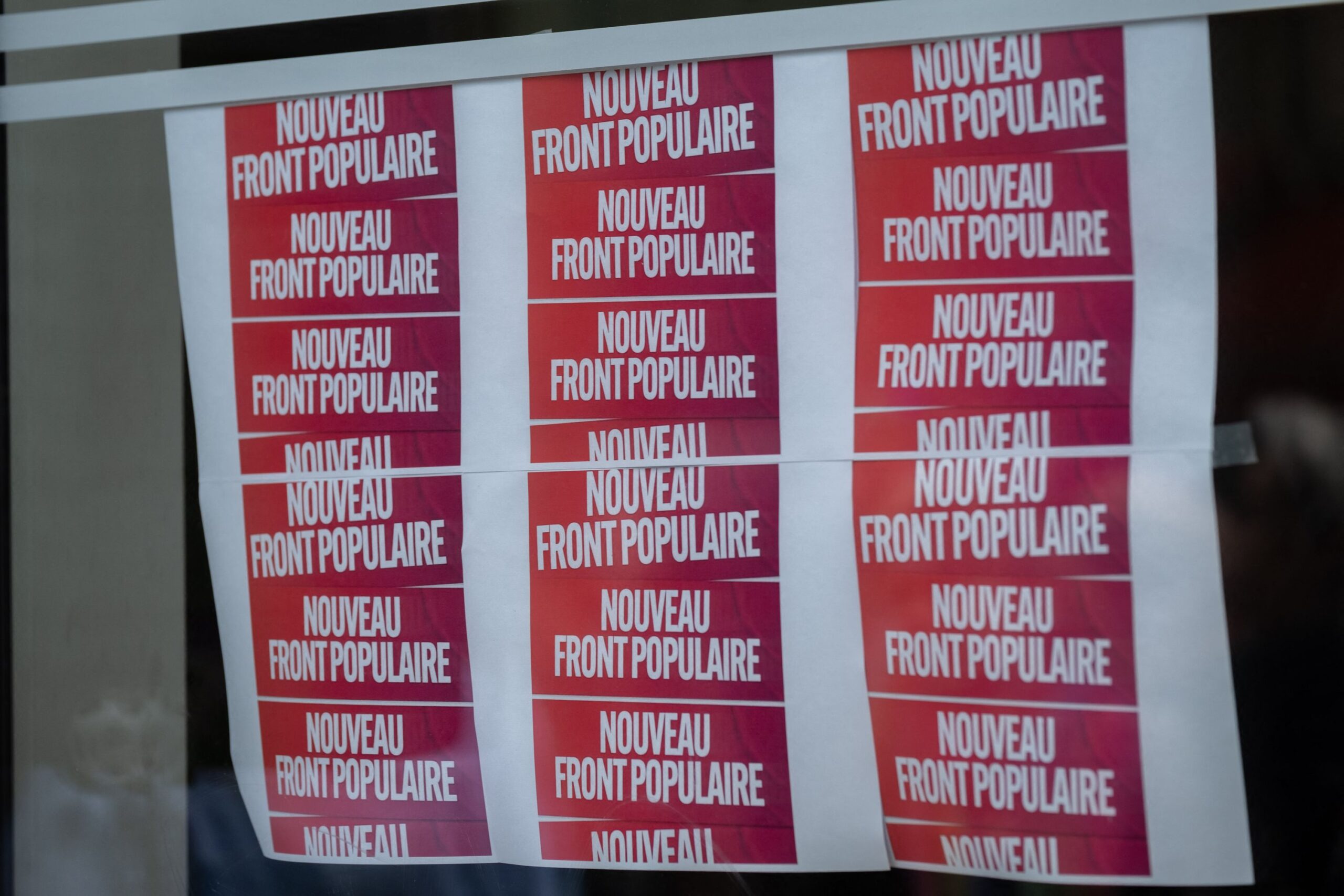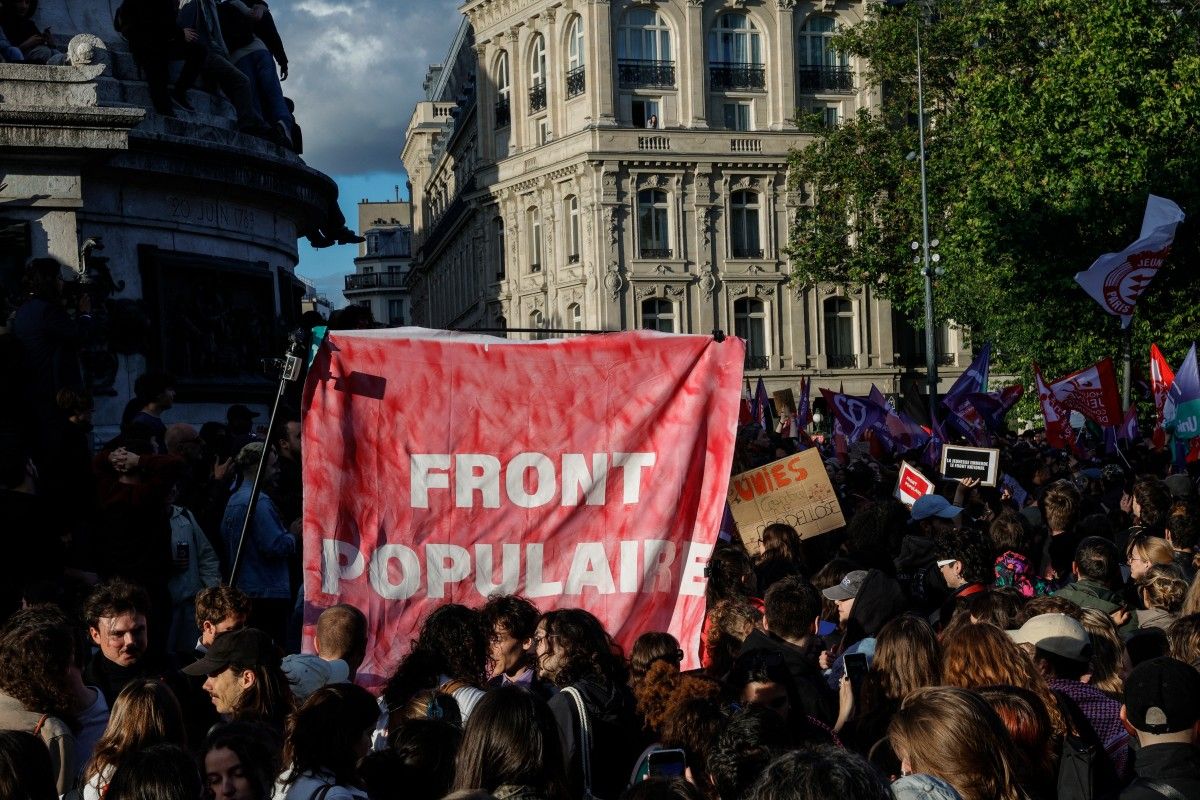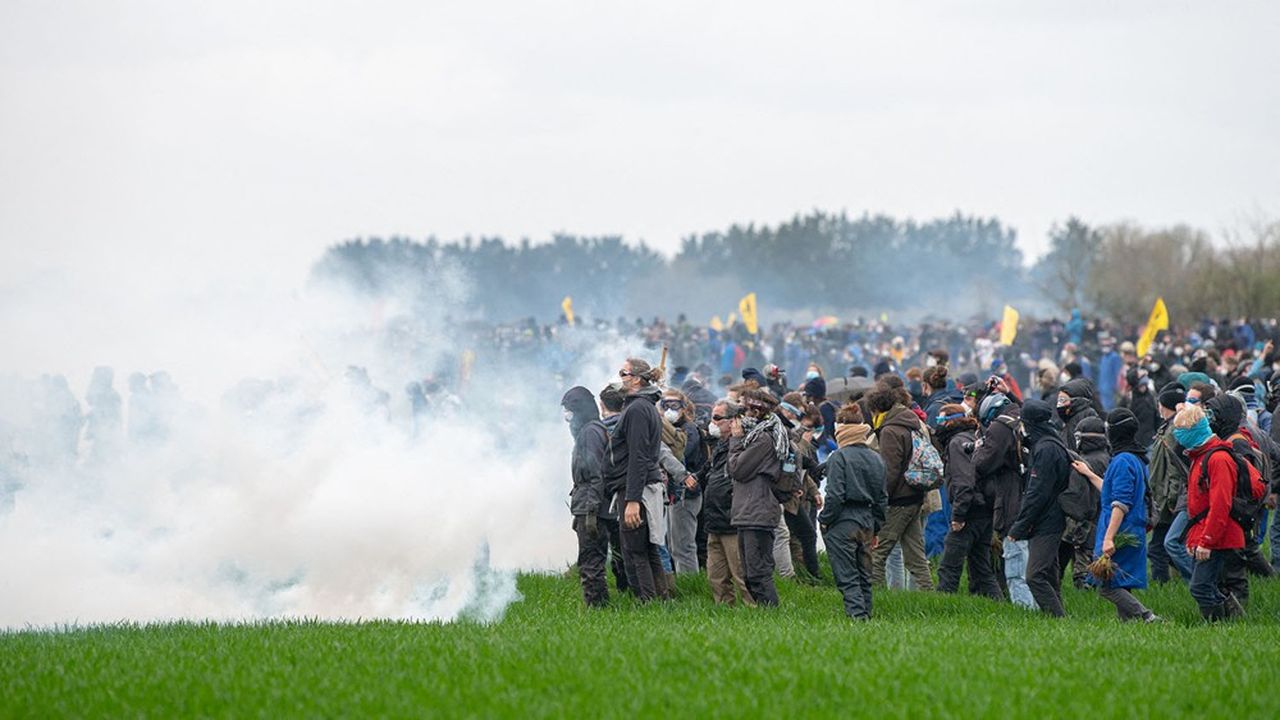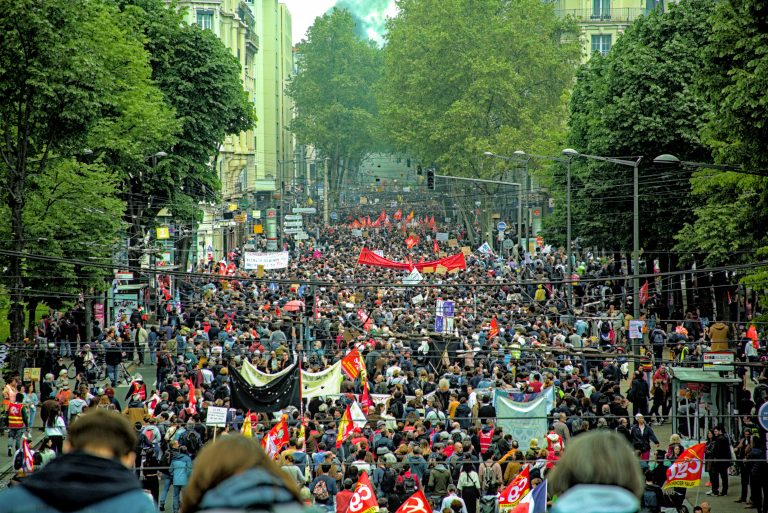If, at the top of the state building, they play the violin, how can we not expect those at the bottom to start dancing?
Marx, The Eighteenth Brumaire of Louis Bonaparte
- At the continental level, the June 9 European elections mark a significant step forward in the convergence between neoliberalism and neofascism. Beyond destabilising European governance, the rapprochement between the centrist and far-right factions pushes towards a redefinition of the European integration project, emphasising individual sovereign states and the central bank’s synchronisation role, not without potential conflicts.
The impact of the European elections on the majority’s composition and subsequent appointment of commissioners remains uncertain. However, the rise of the neofascist component within the Strasbourg parliament undeniably signals a further convergence in the continental political landscape between the “liberal” and “conservative” (that is far-right) poles. This union is still theoretical and will depend on upcoming negotiations. Nonetheless, it is evident from the progressive rapprochement between Ursula Von Der Leyen and Giorgia Meloni—praised as an efficient and reliable government partner. This convergence must be understood in the light of a process ongoing for several years, where the liberal centre is increasingly subjected to far-right pressures, and the far right is progressively tamed by directions from the Brussels technocracy, the ECB, and NATO strategies. Within the EU, this bond further weakens the already fragile Franco-German axis, struggling more and more to balance between US pressures, the need for continental strategic autonomy, and the not always cohesive push of nationalisms from many Eastern European countries. The window of opportunity for a European New Deal, opened by the Covid-19 pandemic, is now a distant memory. In the shadow of the USA-China strategic competition and the emergence of groups like BRICS+, the reconfiguration of the Union’s political balances occurs within a “global war regime”, with the Russia-Ukraine war being the continental vector. Macron and Scholz’s attempt to base the electoral campaign on the unscrupulous use of bellicose rhetoric was heavily defeated at the polls. In a scenario of generalised stagnation and recession, with German neomercantilism struggling due to new trade relations with Russia and China, the European setup, increasingly confederal and Atlanticist, accentuates its ethno-nationalist traits. On the Mediterranean front, continue the massacre and mass detention of migrants caused by pushbacks at sea and the externalisation of European borders onto African territory and beyond; on the northeastern front, the conflict in Ukraine is instrumentalised for the militarisation of European space, invoking human rights against “eastern despotism”; while, on the Middle Eastern front, Israel presents itself—not only in the discourse of the far-right Zionists—as the pivot of “Judeo-Christian identity” outside European borders and, deceitfully, as a military outpost against “Islamic terror.” In a context of growing international tension, the expansion of war rhetoric and the construction of a war economy expose the European Continental Building process to increasing contradictions, affecting its material constitution and its very founding myths. Instead of developing as a universalist project aimed at expanding rights, social welfare, and democracy, the European space now actively participates in reinforcing the clash between opposing imperialist poles, positioning itself firmly—albeit subordinately—within an increasingly militarised and menacing “West”.

- Macronism does not represent an alternative to, but rather the French variant of, the progressive convergence between neoliberals and the far right. The supposed moderate katèkon, intended to prevent a Le Penian catastrophe, has actually accelerated the authoritarian turn of the Fifth Republic. This shift functions as a counter-insurrectional mechanism reacting to the formidable cycle of French struggles.
By dissolving the National Assembly on the evening of the European elections, Macron aimed to simplify the three poles in the parliamentary arc. His goal was to eliminate, or at least significantly reduce, the influence of the left in favour of a tight contest between neoliberals and neofascists. Beyond specific factors—such as the lack of a clear presidential majority since 2022, the risk of a no-confidence vote in the fall over the financial budget, and the need for a political relaunch after a resounding defeat—Macron’s decision particularly aimed to isolate and marginalise La France Insoumise (LFI), the only political force that has actively supported anti-racist struggles and the pro-Palestinian movement since the banlieue uprising in July 2023.
Therefore, it is not, as some commentators have recently suggested, a heroic attempt to save his majority even at the cost of cohabitation with the far right. Instead, it is a choice that sees the possibility of cohabitation with the Rassemblement National (RN) as the “lesser evil” compared to the prospect of the radical left’s growth, both in the streets and in institutions, in anticipation of the 2027 presidential elections. Viewed in this light, the decision to dissolve the National Assembly marks the latest step, and a qualitative leap, in the reactionary drift of Macronism. In eight years of governance, Macron has shed all pretence. In his first term, his “liberal and progressive” project manifested in privatisaations, austerity, fiscal injustice, and the repression of social movements. In his second term, the “presidential bloc” has sharpened its authoritarian and identity-based traits, continuing the project of dismantling public services.
In the process of dismantling the French welfare system, Macron has made increasingly significant shifts to the right. Following the thread of repression, from the bloody role of Police Prefect Didier Lallement—brought to Paris to crush the Yellow Vests uprising with his motorised brigades—we have seen the rise of Interior Minister Gérald Darmanin, champion of “republican order” in both the suburbs and overseas colonies. Following the thread of security and racial dominance, from the constitutionalisation of the “state of emergency”, we have moved to the Loi de sécurité globale and the so-called “separatism” law, which serve as legal validations of state Islamophobia.
This rightward shift of Macronism cannot be understood without considering the formidable cycles of movements that opposed it and sometimes forced it to retreat: the Yellow Vests (2018-2020), the social strikes against the railway and pension reforms (2018, 2020, 2023), and the banlieue uprising against state racism (summer 2023). These struggles, often insurrectional in nature—particularly in the case of the Yellow Vests, the anti-racist uprising, and the mobilisations in the so-called “Overseas France” territories—have met with a counter-insurrectional response from Macronism. From this perspective, Macron’s potential openness to the far right is not a sudden development. On the contrary, it has been announced and built over the past few years and, particularly, in recent months. Politically, the opening to far-right Le Penism has been prepared by systematically equating the radical left with communitarianism, anti-racism with Islamism, and pacifism with anti-Semitism. This drift culminated in the parliamentary saga of the Loi Immigration: a law not only approved thanks to far-right votes but also inspired by Marine Le Pen’s RN proposals (which were declared unconstitutional by the Constitutional Council). In the public debate, the acceptance of Le Penism has also been facilitated by its “normalisation” by centrist media and the enthusiastic support of the media giant owned by the Vincent Bolloré group.
- Macronism signifies the terminal crisis of the Fifth Republic and reawakens the latent relevance of its origins: the “permanent coup d’état”. Within this crisis, the anti-fascist republican arc transforms into an anti-popular arc, where the extreme centre and the far right converge with the aim of a new reactionary stabilisation.
Born during the Algerian War of Independence with De Gaulle’s “constituent referenda”, the current French constitution draws inspiration from the Weimar Republic regarding presidential powers and the relationship between the president and parliament. Initially and for a prolonged period, the “formal” constitution of the Fifth Republic was supported by the “material” constitution of French society: following Mitterrand’s victory in 1981, the alternation of government between Gaullists and socialists symbolised a parliamentary compromise between bourgeois forces and reformist movements concerning political rights and wealth distribution.
Already compromised and weakened by successive neoliberal and security reforms under Sarkozy and Hollande, this model of concertation, based on a harsh dialectic between social struggles and institutional mediation, faced an irreversible crisis under Macron. Macron’s destabilisation of the constitutional framework, both formal and material, has been pursued through the exacerbation of the Fifth Republic’s most authoritarian and hierarchical traits. The combination of neoliberalism and Bonapartism thus seals the reactivation of the “permanent coup d’état” logic embedded in De Gaulle’s constitution, where the technocratic tendencies of the former underscore the authoritarian nature of the latter.
The unscrupulous and continuous use of legislative devices to bypass parliamentary debate (blocked vote, Art. 47.1, Art. 49.3), the refusal to mediate with all intermediary bodies—particularly the unions—and the mass arrests and maiming of protesters during intense mobilisations have contributed to a profound disconnection between power and society.
The collapse of the “republican arc”—the electoral strategy that, over the last three decades, has prevented Le Pen’s party from accessing power—finds its material and symbolic genesis in this “post-liberal” spiral. Ultimately, the crisis of the Fifth Republic’s institutions culminates with the disintegration of the Macronian political bloc, paving the way for a new, thoroughly reactionary stabilisation.
Since 2017, the coalition led by Macron has represented a paradoxical hegemonic minority bloc: a bloc chosen by voters in the absence of alternatives, against the far right, and with the lowest turnout rates in French history. Its current decomposition highlights the imminent possibility of Marine Le Pen’s RN seizing power, having attracted a significant portion of Republican politicians and voters into its orbit. The “cohabitation”, currently only theoretical, between Macron and a government led by the RN is foreshadowed by the collapse of the “republican front” and its gradual transformation into an “anti-popular front,” which opposes the advance of radical and progressive forces.

- The new social and political pact that unites neoliberals and neofascists is an economic pact with ethno-racial connotations.
The disintegration of the “republican arc” and the formation of an “anti-popular arc” are closely tied to the redefinition of public discourse following the anti-racist uprising in the summer of 2023 and Israel’s genocidal war in Gaza after the attacks on 7 October. A diverse coalition of political forces now portrays France as a society fractured and destabilised by a supposed “clash of civilisations”. From such a narrative “secularism”, a foundational value of the République, becomes the equivalent of its antithesis: Islamophobia, xenophobia, and the persecution of dissenters. In this war-like regime, the internal enemy merges with the external enemy, embodied in the so-called “Islamo-leftism” [Islamo-gauchisme], which “moderate” and “conservative” commentators decry, alleging its roots in the banlieues and universities.
This concept, along with others, now forms an ethno-racial lexicon. It is typically associated with “separatism” and “communitarianism”, terms used to denote the supposed non-integration of the most precarious communities in working-class neighbourhoods, quickly labelled as “Muslim”, to the values and institutions of the République, and more recently, to the damning accusation of “anti-Semitism”—a term that, thanks to Israeli propaganda, now encompasses any criticism of Zionist colonialism.
In this context, the inauguration of the 2023-24 school year with the banning of the abaya, mandated by then-Education Minister Gabriel Attal (a strategic move that bolstered his credentials for the Prime Minister position), sent a clear message of alignment with the far right and responded to the summer’s anti-racist uprising following the murder of young Nahel with a stricter model of French “integration”. It is no coincidence that a figure like Fabrice Leggeri, a high-ranking French official who headed the European border management agency Frontex, was one of the RN’s leading candidates in the European elections. According to recent studies, the rationale behind Le Pen’s support is guided more by a “racial” logic than a “class” one.
Despite evident frictions with some of Macron’s policies—particularly in foreign affairs—the RN’s “call” to governance could be solidified through a series of convergences around this common appeal to a racist law and order agenda. This alignment would not undermine but rather exacerbate the austerity and neoliberal economic policies already in place.
- The cycle of French struggles in recent years forms the foundation for the New Popular Front and can sustain its momentum beyond electoral deadlines and institutional dynamics.
The emergence of the New Popular Front (NFP) is a direct expression of the formidable cycle of French struggles in recent years, which constitute its historical foundation. The alliance of various progressive formations and the radical nature of their coalition program are tangible evidence of the stratification of struggles and demands from social movements. Beyond the call for a new union of the left, which resonated strongly in the streets immediately following the elections, the “breakthrough pact” of the NFP explicitly incorporates many of these movements’ demands: from the RIC (Citizens’ Initiative Referendum, advocated by the Gilets Jaunes) to the repeal of the notorious Article 49.3 (allowing laws to be passed by decree); from the abolition of the pension reform to the recognition of the State of Palestine; from the dissolution of the BRAV-M (a motorcycle riot police unit notorious for police violence) to a massive project to revitalise public services, particularly healthcare.
These movements bring the tumultuous experiences of recent years’ struggles into the process of forming the Popular Front, imposing profound changes on issues such as anti-racism and ecology. In other words, the programme is not formulated solely by party secretariats: its non-negotiable elements live in the streets, squares, and workplaces. These places are ready to assess the NPF’s actions regardless of the legislative election outcomes. We are, in short, witnessing a virtuous historical dynamic of which the NPF is the latest expression, tending to assume the contours of a true dual power.
We do not underestimate the importance of negotiations between leftist political forces, nor the limits of the common programme or the issues that mark some decisions on candidacies. Alongside this process, however, we want to emphasise how the NPF already acts from the grassroots, in the permanent mobilisation of social movements in major French cities, once again reactivating the historical significance of recent years’ cycles of struggle. Unlike what happened in other places and times, we believe this dual power should not be resolved and synthesised through the absorption of movements into the electoral coalition but should instead be consolidated.
If the institutional dimension appears crucial today for the development of struggles, extinguishing or even merely diminishing their autonomy through co-optation logic would deprive the NPF of its primary source of “political creativity” and drastically reduce the potential effectiveness of any institutional transformation. We reiterate strongly: the movements cannot be “co-opted”; they must continue to assert and strengthen their autonomy. This necessity is not only in the interests of the movements but also—if not especially—in the interest of an original political force like the last LFI. On many occasions, we have seen this virtuous mutual consolidation at work, with LFI amplifying struggles and the struggles pushing LFI toward increasingly radical positions. Without this dialectical tension between social struggles and political forces operating within institutions, both would likely be weakened.

- Beyond France, expanding constituent power.
The consolidation of power dualism represents, we believe, a decisive prospect in the current French conjuncture, but it also constitutes a major stake beyond France. Triggering a constituent phase would also have significant implications at the European level. The current conjuncture of war, with the polarisations it brings, may create unpredictable gaps within and against which we must insert ourselves. Constituent assembly, certainly, enabling the overcoming of the Fifth Republic; openness to the multiplicity of histories and identities that make up “France” today; reorganisation of public services and welfare state around the principle of the common; constitutional anchoring of the direct democracy experiences of recent years, such as the communalist or municipalist forms experimented with by the Gilets Jaunes in the Assembly of Assemblies, the interprofessional strike committees during the movement on pensions or, again, the hundreds of local committees that make up the ecologist movement Soulèvements de la terre. At the same time, beyond the individual programmatic elements, however, the groundwork must be laid for this constituent process to consolidate, grow over time and find international resonances. If, as we have said, the formation of the NPF was not given without power dualism, its future is inseparable from its national and continental expansion and irradiation. The multiplicity of struggles that have dotted the French landscape from 2016 to the present have profoundly transformed not only a political formation like LFI, but also many grassroots unions and social organisations, radicalising them. Beyond the always provisional balance sheet we can draw from them, there is here the trace of a new relationship between popular uprisings, social movements, and party and union institutions, which can resonate powerfully even beyond France borders. Indeed, it is the social struggles that express the engine and strategy – as shown by the positions taken by LFI on racism, secularism and Islamophobia thanks to the disruptive mobilisations of recent years – while the political articulation and tactics act as a multiplier of the movements. All of this has been of paramount importance so far and has been the only curb to the intensification of the otherwise very advanced processes of neoliberalisation and fascisation of French society. But this, at the same time, is not enough. If it is to withstand the reaction of the Macronist bloc and the Lepenian bloc, the NPF’s “rupture pact” and the constituent power that accompanies it must anchor itself even more in the places of life and work, establish itself in the duration and take charge of an extended temporality of the transformation process. We want to be clear: much, but not everything, is at stake in the coming weeks. Far beyond the nefarious role of Hollande, Glucksmann & C. in the event of eventual defeat, or victory, decisive will be how this dialectical relationship between social insurgency and political representation can continue to condition developments in the country, radiating beyond France. In the long time of the transformation process we are about to experience, there will certainly be no shortage of precipitations, exemplary battles and unforeseen events to react to. It is the task of the collective intelligence formed and manifested in the struggles to prepare the political instruments and forms of organisation to act on these different temporalities. Against fascism, against war, against the convergence between the bourgeois pole and the neo-fascist pole, there is a horizon of common life that together we must consolidate and affirm.
* Text resulting from a discussion at the Séminaire Capitalisme Cognitif in Paris.

